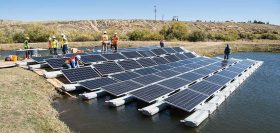Climate Change Policy: Fossil Fuel Regulation
When it comes to addressing climate change, the typical top culprit identified is fossil fuels. Fossil fuels are energy sources that are found naturally underground after having spent thousands or even millions of years being created and trapping energy sources that can be extracted when burned, but in addition to releasing the energy the combustion process is noteworthy for releasing the trapped carbon and other greenhouse gases. As such, extracting, refining, and utilizing fossil fuels is a significant source of climate change and certain policies have sought to cut straight to the point by regulation where fossil fuels can or can’t be extracted, how (if at all) they are allowed to be burned for fuel, and other restrictions.
This is the role that governments can have the most impact on, according to some advocates. According to Deia Schlosberg of Pale Blue Dot Media:
“The most important thing to do is to stop the production of fossil-fuel based infrastructure, to stop extraction of fossil fuels and chemicals. There are different types of legislation to encourage that—more stringent regulations, more regulators on the ground, less corporate donations to politicians, market-based approaches, and extending producer responsibility for waste and pollution.” – Deia Schlosberg, Pale Blue Dot Media
Key examples of strategies for fossil fuel regulation include the following:
Banning Fracking of Oil and Gas

What is it: Fracking, the shorthand commonly used for hydraulic fracturing, was developed in recent years as a new way to extract oil and gas from the Earth that was more effective at reaching certain fossil fuel reserves that were previously not technically or economically recoverable. Fracking is able to retrieve oil and gas from shale or other forms of tight geologies (meaning they were impermeable to traditional extraction methods), but it’s increasingly come under fire for the hazards it poses to nearby water systems, the risk that it may lead to an increase in seismic activity, the resultant air pollution, and the tendency it has to lead to methane flaring and leaks (methane being the most potent greenhouse gas commonly found in the oil and gas industry). For all of these ills of fracking, many policies and policymakers have sought to outright ban the use of fracking to reach oil and gas, or at the very least limit where fracking is allowed or put tighter regulations on the fracking process via environmental regulations.
Is it enacted anywhere: As of 2019, fracking is banned in Oregon and Washington, while it is restricted in Florida.
In Favor of Banning Fracking of Oil and Gas:
“Zero Hour looks towards legislation to ban fracking and other policies that ultimately keep fossil fuels in the ground. It is known that fracking causes harm, is dangerous for water and people, and is contributing significantly to climate change. We’ve seen effective legislation before so we know it’s possible. One example is in New York State where legislators reclassified the process of fracking as using hazardous waste, effectively banning fracking in the state. Federally, we’ll be pushing for Congress to pass H.R.5857 – Fracking Ban Act introduced by Rep. Ocasio-Cortez. We know that climate change is caused by burning fossil fuels, so any legislation that supports ending that practice is legislation that we support.”- Zanagee Artis, Co-Founder of Zero Hour
Against Banning Fracking of Oil and Gas:
“[A fracking ban] would be a far reaching proposal that would undermine AMerican national and energy security to the detriment of the American people. We would be very concerned about those kinds of proposals coming out of the Biden Administration.”- Mike Sommers, Chief Executive at the American Petroleum Institute
Read more:
Economic and National Security Impacts of a Hydraulic Fracturing Ban – U.S. Department of Energy
What If…Hydraulic Fracturing Was Banned? – Global Energy Institute
Banning Production and/or Use of Coal

What is it: A common refrain when looking at the coal industry from climate advocates is the push to ‘leave it in the ground.’ Coal has long enjoyed prominence in the energy generation sector because of its relatively low cost and ease of on-site storage, but coal is typically the most carbon-intensive energy source used in power production, meaning the generation of a kilowatt-hour of electricity with coal emits more greenhouse gas that producing the same electricity via other fuels. Because new and improved fuel sources and burning technologies are constantly negating any advantages coal had, a significant policy push in certain arenas has come with the goal to ban the use of coal (not just in the electric power sector, but also for industrial or residential heat purposes) or even require the shutdown of mines where coal is produced in the first place.
Is it enacted anywhere: Multiple countries, including Finland, the United Kingdom, Canada, Germany, Austria, and Hungary have all approved government-backed phaseouts of coal to eliminate its use, while Belgium has been officially coal-free since 2016.
In Favor of Banning Production and/or Use of Coal:
“We want an end to coal mining and use in New Zealand, which includes a ban on exporting coal. The main uses of coal mined in New Zealand are for process heat in industry and for export for use in steelmaking in other countries. While coal does play a role in electricity production in New Zealand, particularly as backup generation, it’s smaller than in other countries. So the goal of ending coal mining and a phase out of coal use is more easily achievable here, and we’re calling for an immediate ban on new and expanded coal mines, an urgent phase out of existing coal mines, and a just transition for coal mining communities.” – Tim Jones
Against Banning Production and/or Use of Coal:
“Coal is affordable and abundant and mined right here in America. It supports thousands of jobs in West Virginia and across our country that we can’t afford to lose at a time of near double digit unemployment. I am proud to stand with the miners at today’s rally to remind Congress of the vital role this reliable American energy resource plays in our economic and energy portfolios.” – West Virginia Republican Rep. Shelley Moore Capito
Read more:




